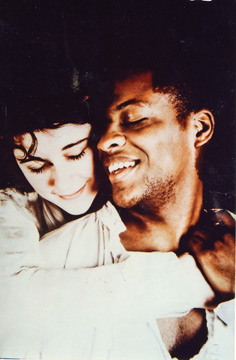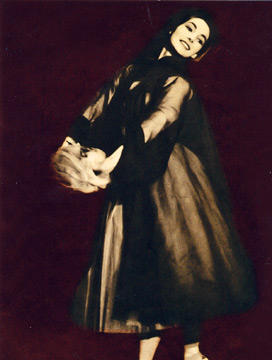Bard poised between Marlowe and Spencer
by Gwen Herat
Christopher Marlowe was the victim of Shakespeare's challenge to the
literary pre-eminence of Edmund Spencer as a dramatist in terms of his
rivals. The Bard was forced to think quickly and at times badly and with
intent. It all happened because he was poised between Marlowe and
Spencer. Equally and significantly were the wars of the theatres at the
time. As dramatists wrote for companies, Shakespeare's plays were
rivalled by Ben Jonson.
|

It would have stunned Shakespeare to see a
black Romeo. |
While Shakespeare's humour dominated some comedies, the Jonson plays
were read as an array of satire and dysfuctional characters. Both had an
equal balance in comedies during their time as read by readers and
witnessed by theatre goers.
But with time, may be two centuries later, Shakespeare wipe off all
Jonson plays from the face of the earth.
No doubt he was much more live to the literature of his time, this
grammar school boy who had not attended a proper school or seen the
inside portals of seats of learning like his colleagues who found it
difficult to accept that he was not only a playwright but also a poet.
When young, he was keen to prove that he was the pre-eminent poet of
his generation and in a legitimate challenge to established names.
Given the task to prove, he took on Spencer who was universally
acknowledged as the best Elizabethan poet.
Complex
But Shakespeare had a complex in the face of Spencer being much less
colourful than him. But his exciting contemporaries such as Marlowe,
Sydney, Raleigh, Jonson and Nash were seen differently because of their
university education.
With the publication of The Shepheardes Calander, Spencer established
himself and enhanced his reputation in 1579 based on a vivid
experimental work in which a group of literary shepherds appear in 12
poems, one for each month. It was a remarkable and unusual bit of work
so original in its authenticity where the shepherds discuss the affairs
of the heart, religious problems and and issues on how to write good
songs and poetry.
Spencer had opened great opportunities from which to reveal his
multiple talents. He combined a dazzling array of styles and forms
evolving the best of French, Latin and English traditions. He did not
hesitate to experiment with printing techniques. By these unique
applications, Spencer produced a Calendar in an edition of humanist
works of a classical poet.
In this process, Shepherds Calendar represented a hopeless situation
for Rosalind (from Romeo and Juliet) by the use of this name for a woman
who does not actually take the stage which indicates that Shakespeare
took his cue from Spencer. He was greatly influenced by Spencer's poems
as did other Elizabethan writers.
Speculation
Shakespeare used the name Rosalind for his principal female character
in As You Like It giving rise to speculation that he adapted this name
from Thomas Lodge's prose in a romance he wrote for the stage in 1590
but there was no proof what so ever.
But Lodge had been a pupil at the Merchant Taylor's School with
Spencer which would have led to the elder poet's work when writing
Rosalind.
Was Shakespeare serious on this mix-up?
|

Anya Linden as Rosalind in the 1958 production of
Romeo and Juliet |
However, what looks like a reaction to Spencer's poem occurs in Romeo
and Juliet, where Rosalind was Romeo's first love. At the beginning
Romeo is seen praising the beauty of an unknown woman who later turns
out to be Rosalind. Once Romeo has seen Juliet, he forgets her but
remain a trace as supplanted love but disappears.
The exchange of words between the Friar and Romeo brings back to the
audience that the forgotten Rosalind no longer futures in Romeo's life.
When Friar Laurence asks Romeo ‘Was thou with Rosalind?’
Romeo replies ‘I have forgotten the name and that name is woe’
The Friar expresses surprise ‘What a change is here. Is Rosalind thou
claims that thou didst love so dear, so soon forgotten.’
Romeo claims that he has now forgotten Rosalind but her name is
repeated six times in 38 lines. He is trying to forget her but the
audience as well as the reader is forced to remember her.
In the ballet of Romeo and Juliet, Rosalind dances into the hearts of
the audiences before she fades away at the entrance of Juliet who is her
cousin by right.
Attention
Rosalind who is never there takes a long time to disappear and the
amount of stage time spent in discussion over a woman in her position
is, unusual and directs our attention to Shakespeare who obviously would
have been inspired with Spencer's work and had him supplanted just the
way Spencer transformed the scope and significance of love. Shakespeare
revealed that he could do better than Spencer by transforming English
poetry in his plays.
Another glowing example is when the Bard puts words in the mouth of
Benvolio whether he was laughing at his speech and his friend denies it.
But Shakespeare had given his main character a series of ridiculous
lines which are replaced later by more inspired and daring descriptions
of love. In representing Rosalind the Bard was showing that whatever
Spencer had done, he could do just the same as well, if not better. But
Spencer is still giving Shakespeare a run with more books written on
Spencer's poetry as well as an edited version of his Shepherds Calendar.
|

